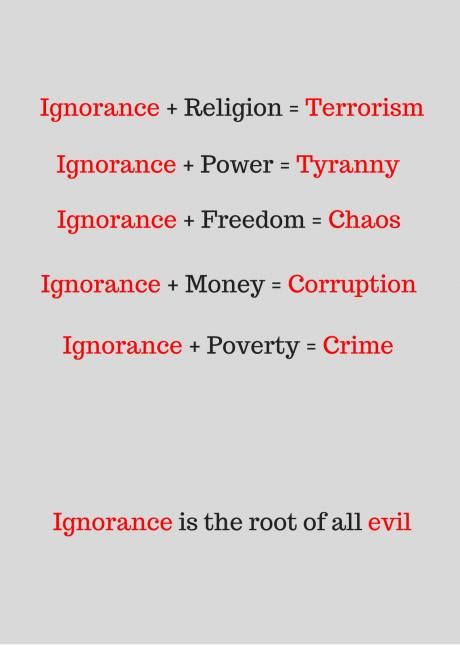Understanding the Bahá’í teachings reveals a profoundly entrenched focus on the concept of ignorance as a pivotal adversary in the quest for spiritual and societal progress. Within the Bahá’í framework, ignorance is not merely a lack of knowledge but an impediment that hinders individual and collective advancement. The emphasis on uprooting ignorance is a clarion call for the enlightenment of humanity, advocating continuous education and moral development as essential components in the amelioration of the human condition.
At the core of Bahá’í teachings is the belief that ignorance breeds discord, prejudice, and degradation. It is posited that when individuals cling to ignorance, they foster an environment ripe for misunderstandings and conflict. This notion resonates throughout the scriptures, illustrating that ignorance serves as a potent catalyst for societal disarray. Therefore, to combat ignorance, one must embark on an informed, deliberate, and concerted effort to cultivate knowledge and understanding.
In examining the multifaceted nature of ignorance, it is crucial to differentiate between various types that can plague humanity. Broadly categorized, these can be intellectual, social, spiritual, and emotional ignorance. Intellectual ignorance encapsulates the absence of education or critical reasoning abilities, while social ignorance pertains to a lack of awareness regarding diverse cultures and communities. Spiritual ignorance is characterized by a disconnection from one’s inner self and a failure to realize one’s purpose, whereas emotional ignorance reflects an inability to comprehend and manage one’s feelings and those of others.
To effectively combat these forms of ignorance, the Bahá’í teachings advocate for a holistic approach centered on education and self-reflection. The following guidelines delineate practical strategies for individuals seeking to transcend ignorance in their own lives and communities.
1. Embrace Lifelong Learning
The pursuit of knowledge is vital. Education is a powerful instrument for combating ignorance. Engage in formal education, explore literature, and participate in discussions that challenge preconceived notions. By actively seeking knowledge, one transcends the limitations of ignorance. The Bahá’í emphasis on the importance of education for all, especially women and girls, serves as a fundamental principle in dismantling societal ignorance.
2. Cultivate Open-mindedness
Open-mindedness fosters an environment conducive to the exchange of ideas and perspectives. It invites dialogue and understanding between disparate groups, creating a rich tapestry of shared knowledge. By setting aside biases and facilitating discussions with those holding differing viewpoints, individuals can gain deeper insights, thus eradicating social ignorance. This open exchange is instrumental in countering the narratives that perpetuate division and misunderstanding.
3. Engage in Self-reflection
Self-awareness is foundational in the quest for knowledge. By examining personal beliefs, biases, and motivations, individuals can unearth the roots of their ignorance. Self-reflection encourages individuals to confront uncomfortable truths about what they do and do not know, paving the way for cognitive growth and spiritual enlightenment. Engaging in practices such as meditation can enhance this introspective journey, allowing individuals to connect with their spiritual essence.
4. Foster Empathy and Compassion
Empathy serves as a bridge connecting individuals from varied backgrounds. To mitigate emotional ignorance, it is incumbent upon individuals to practice compassion in their interactions. Recognizing that every person has a unique narrative fosters understanding and dispels prejudice. Bahá’í teachings emphasize the significance of shared humanity, advocating that compassion is integral to individual and collective flourishing.
5. Advocate for Educational Initiatives
Engaging in community initiatives that promote educational opportunities can significantly combat ignorance. Actively participating in or supporting programs that provide educational resources to underprivileged communities embodies the spirit of service espoused by Bahá’í teachings. By advocating for the universal right to education, individuals contribute to the dismantling of intellectual barriers that perpetuate cycles of ignorance.
6. Challenge Prejudices
Addressing and challenging societal prejudices is crucial to combatting ignorance. Being aware of one’s own prejudicial tendencies and actively working to counter them is a step toward eradicating ignorance. This can involve educating oneself about the experiences of marginalized groups or speaking out against stereotyping and discrimination. The Bahá’í teachings promote the principle of oneness and the elimination of all forms of prejudice, deeply embedding the necessity for social justice within the educational framework.
7. Engage with Global Perspectives
Connecting with diverse cultures and global perspectives enriches one’s understanding of the world. This can be achieved through travel, cultural exchange, or participation in international dialogues. Exposure to diverse perspectives broadens one’s outlook, challenging preconceived notions and fostering a greater appreciation for the complexities of existence. The Bahá’í teachings encourage individuals to view the world as a global community, emphasizing the importance of unity in diversity.
8. Use Technology Wisely
The digital age provides unprecedented access to information. However, it is essential to navigate this landscape judiciously. Utilizing technology to acquire knowledge and promote educational initiatives can be an antidote to ignorance. Engaging with reputable sources and utilizing online platforms for learning and dialogue can mitigate the resurgence of ignorance in a world increasingly inundated with misinformation.
In conclusion, the Bahá’í teachings elucidate the imperative of combating ignorance in all its forms. Through dedicated efforts in education, self-reflection, and advocacy, individuals can illuminate the path toward enlightenment for themselves and their communities. As members of a global society, the collective efforts to fight ignorance will yield a more just, compassionate, and harmonious world, aligning with the inherent Bahá’í principle of unity in diversity. The eradication of ignorance, therefore, is not merely a personal endeavor but a communal responsibility that resonates deeply within the fabric of the Bahá’í faith.
